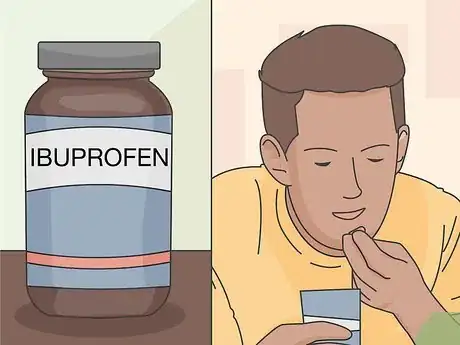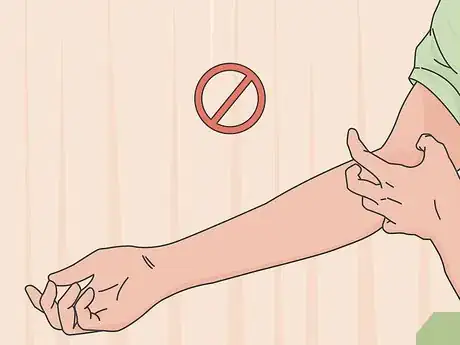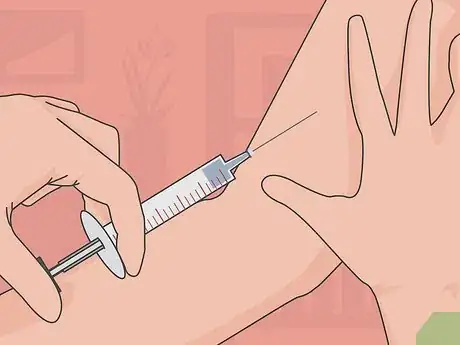This article was medically reviewed by Raj Vuppalanchi, MD. Dr. Raj Vuppalanchi is an Academic Hepatologist, a Professor of Medicine at Indiana University School of Medicine, and the Director of Clinical Hepatology at IU Health. With over ten years of experience, Dr. Vuppalanchi runs a clinical practice and provides care to patients with various liver disorders at the University Hospital in Indianapolis. He completed dual fellowships in Clinical Pharmacology and Gastroenterology-Hepatology at Indiana University School of Medicine. Dr. Raj Vuppalanchi is board certified in Internal Medicine and Gastroenterology by the American Board of Internal Medicine and is a member of the American Association for Study of Liver Diseases and the American College of Gastroenterology. His patient-oriented research is dedicated to finding new treatments for various liver disorders as well as the use of diagnostic tests for non-invasive estimation of liver fibrosis (transient elastography) and portal hypertension (spleen stiffness).
There are 20 references cited in this article, which can be found at the bottom of the page.
This article has been viewed 52,791 times.
Hepatitis A is an inflammatory liver disease caused by the hepatitis A virus, which is primarily spread by eating food or drinking water that's contaminated with feces (poop) from an infected person.[1] Symptoms of hepatitis A include clay-colored bowel movements, dark urine, and yellowing of the skin and eyes. Unlike other types of hepatitis (B and C), hepatitis A doesn't cause chronic liver disease and is rarely life threatening. Mild cases don't typically require treatment and most people recover within a few weeks with no permanent liver damage. More severe cases take longer to resolve (a few months or so) and typically need supportive treatment for the flu-like symptoms. There is currently no cure for hepatitis A.[2]
Steps
Treating Hepatitis A
-
1Get lots of rest. Symptoms of hepatitis A are often described as flu-like and include fatigue (tiredness), weakness, loss of appetite and a low-grade fever.[3] To combat these symptoms, get plenty of rest, especially during the initial stages of the infection, and temporarily reduce your activities and exercise regiment.
- You'll probably need to stay home from work or school until the flu-like symptoms fade away (a few weeks of so).[4]
- Focus on getting at least 8 hours of quality sleep each night, if not more.
- Take a break from the gym for a few weeks until your energy levels build back up. Instead, go for a short walk on occasion to get some fresh air and stimulate your blood circulation.
-
2Take pain relieving medication with caution. Other symptoms associated with hepatitis A are abdominal pain or discomfort near your liver (upper right side beneath your ribs) and joint pain, especially large joints such as your hips, spine and knees. Ibuprofen (Advil, Motrin) can help reduce painful symptoms, but keep your dosage well below maximum recommended amounts.[5]
- The liver is responsible for processing (metabolizing) drugs in your body, so higher doses can irritate, inflame and damage liver cells, especially if they're already infected with viral hepatitis.
- Avoid taking acetaminophen unless you've talked with your doctor.
- Adults tend to experience more symptoms than children because their liver cells don't grow and regenerate as quickly.
Advertisement -
3Cope with nausea and vomiting. Another common symptom of hepatitis is mild-to-moderate nausea and potential vomiting, which can wax and wane throughout the day.[6] To combat nausea, eat smaller meals or snacks throughout the day instead of three large ones. Focus on bland food, such as crackers, bread and white rice. Avoid fatty and fried foods, as well as spicy seasonings.[7]
- Ginger is a natural remedy for nausea, so consider taking ginger capsules, eating pickled ginger or drinking real ginger ale.
- If your nausea and/or vomiting is severe, your doctor may prescribe an antiemetic drug (such as metoclopramide) to reduce the symptoms.
-
4Keep well hydrated. A further complication of chronic or severe bouts of vomiting is dehydration, especially if you can't keep fluids down. Symptoms of dehydration to look out for include: severe thirst, dry skin, sunken looking eyes, lack of urination, headache, confusion and lethargy (fatigue).[8] Focus on drinking purified water and herbal teas for hydration, although chicken / beef broths and diluted fruit juices are also good sources of electrolytes (mineral salts that are lost with vomiting).
- Avoid beverages with caffeine (coffee, black tea, colas, energy drinks) because it's a diuretic that stimulates urination and increases the risk of dehydration.[9]
- If you can't keep yourself hydrated with beverages, you'll need to go to a hospital or emergency clinic to get intravenous fluid through a vein in your arm.[10]
-
5Combat itchy sensations. Another potential side effect with any form of hepatitis or liver disease is a general sense of itchiness (also called pruritus) all over the body.[11] Liver-related itchiness is caused by two main factors: an accumulation of toxins that haven't been filtered out by a damaged liver, and a back-up of bilirubin in the blood.[12]
- To combat itchiness wear loose clothing, avoid hot baths and showers, don't get sunburned and maintain a cool, well-ventilated environment in your home.[13]
- No amount of scratching relieves this form of pruritus, so don't start and then risk getting a skin infection.
- A build-up of bilirubin levels due to a damaged liver also causes yellowing of the skin and eyes, known as jaundice.
- With severe cases of itching, taking an over-the-counter antihistamine medication may help because it reduces inflammatory reactions.
-
6Avoid alcohol. An injured and inflamed liver has trouble processing and metabolizing (breaking down) the toxins in medications, as well as alcohol (ethanol). As such, take it easy on your liver by not drinking alcoholic beverages while your body fights the hepatitis A virus — it may take a few weeks to a few months, depending on the severity of the infection and strength of your immune system.[14]
- Although red wine has some health value (it contains antioxidants), it should also be avoided by people with hepatitis.
- Instead of wine, drink grape juice with meals as long as it doesn't trigger nausea.
- Instead of drinking regular beer after work or on weekends, try non-alcoholic varieties.
Preventing Hepatitis A
-
1Get vaccinated. The easiest way to prevent hepatitis A is to get vaccinated with the hepatitis A vaccine. It's proven to be effective at preventing infection by the virus. Hepatitis A vaccines are typically given in two doses — an initial shot in the arm followed by a booster shot at least six months later.[15] All children by the age of two years should get vaccinated to help prevent future infection.[16]
- People who are recommended to get vaccinated include: lab workers who handle hep A, people who work with sewage, men who have anal sex, illicit drug users, patients with chronic liver disease, and people traveling to areas with high rates of hep A.[17]
- The effectiveness of the hep A vaccine ranges from 80-100% after 1-2 doses in most people.[18]
- The three types of vaccines used against hep A are: a monovalent vaccine, a combined hep A and hep B vaccine, and a combined hep A and typhoid fever vaccine.[19]
- For adults, a booster hep A shot is estimated to protect you for at least 20 years.[20]
-
2Be cautious when traveling. If you're traveling to higher risk places where hepatitis A outbreaks frequently occur, then take the necessary precautions. More specifically, peel and thoroughly wash all fresh fruits and veggies yourself before eating them. Avoid eating any raw or undercooked meat, poultry and fish. Drink only bottled water and also use it when brushing your teeth. Don't drink any beverages with ice added.[21]
- Higher risk areas for hepatitis A include Mexico, China, Southeast Asia, Africa, Asia and most parts of South America.
- If bottled water isn't available to you, boil tap water for about 10 minutes before drinking it.
-
3Practice good hygiene. In addition to contaminated food and water, hepatitis A is also transmitted from infected people — either sexually or from their dirty dirty hands.[22] As such, practice good hygiene by frequently washing your hands with warm water and antibacterial soap. As an alternative to soap and water, use an alcohol-based hand sanitizer, especially after you shake hands with someone or handle fresh produce (fruits and veggies).
- Always wash your hands after using the toilet, changing a diaper and before preparing food or eating it.[23]
- The hep A virus can also be transmitted sexually, so practice safe sex and always insist on condom usage.
Expert Q&A
-
QuestionWhat is the most effective way to control hepatitis A?
 Raj Vuppalanchi, MDDr. Raj Vuppalanchi is an Academic Hepatologist, a Professor of Medicine at Indiana University School of Medicine, and the Director of Clinical Hepatology at IU Health. With over ten years of experience, Dr. Vuppalanchi runs a clinical practice and provides care to patients with various liver disorders at the University Hospital in Indianapolis. He completed dual fellowships in Clinical Pharmacology and Gastroenterology-Hepatology at Indiana University School of Medicine. Dr. Raj Vuppalanchi is board certified in Internal Medicine and Gastroenterology by the American Board of Internal Medicine and is a member of the American Association for Study of Liver Diseases and the American College of Gastroenterology. His patient-oriented research is dedicated to finding new treatments for various liver disorders as well as the use of diagnostic tests for non-invasive estimation of liver fibrosis (transient elastography) and portal hypertension (spleen stiffness).
Raj Vuppalanchi, MDDr. Raj Vuppalanchi is an Academic Hepatologist, a Professor of Medicine at Indiana University School of Medicine, and the Director of Clinical Hepatology at IU Health. With over ten years of experience, Dr. Vuppalanchi runs a clinical practice and provides care to patients with various liver disorders at the University Hospital in Indianapolis. He completed dual fellowships in Clinical Pharmacology and Gastroenterology-Hepatology at Indiana University School of Medicine. Dr. Raj Vuppalanchi is board certified in Internal Medicine and Gastroenterology by the American Board of Internal Medicine and is a member of the American Association for Study of Liver Diseases and the American College of Gastroenterology. His patient-oriented research is dedicated to finding new treatments for various liver disorders as well as the use of diagnostic tests for non-invasive estimation of liver fibrosis (transient elastography) and portal hypertension (spleen stiffness).
Academic Hepatologist Getting a hepatitis vaccine is the best way to prevent and control the virus.
Getting a hepatitis vaccine is the best way to prevent and control the virus. -
QuestionWhat happens if I leave hepatitis A untreated?
 Raj Vuppalanchi, MDDr. Raj Vuppalanchi is an Academic Hepatologist, a Professor of Medicine at Indiana University School of Medicine, and the Director of Clinical Hepatology at IU Health. With over ten years of experience, Dr. Vuppalanchi runs a clinical practice and provides care to patients with various liver disorders at the University Hospital in Indianapolis. He completed dual fellowships in Clinical Pharmacology and Gastroenterology-Hepatology at Indiana University School of Medicine. Dr. Raj Vuppalanchi is board certified in Internal Medicine and Gastroenterology by the American Board of Internal Medicine and is a member of the American Association for Study of Liver Diseases and the American College of Gastroenterology. His patient-oriented research is dedicated to finding new treatments for various liver disorders as well as the use of diagnostic tests for non-invasive estimation of liver fibrosis (transient elastography) and portal hypertension (spleen stiffness).
Raj Vuppalanchi, MDDr. Raj Vuppalanchi is an Academic Hepatologist, a Professor of Medicine at Indiana University School of Medicine, and the Director of Clinical Hepatology at IU Health. With over ten years of experience, Dr. Vuppalanchi runs a clinical practice and provides care to patients with various liver disorders at the University Hospital in Indianapolis. He completed dual fellowships in Clinical Pharmacology and Gastroenterology-Hepatology at Indiana University School of Medicine. Dr. Raj Vuppalanchi is board certified in Internal Medicine and Gastroenterology by the American Board of Internal Medicine and is a member of the American Association for Study of Liver Diseases and the American College of Gastroenterology. His patient-oriented research is dedicated to finding new treatments for various liver disorders as well as the use of diagnostic tests for non-invasive estimation of liver fibrosis (transient elastography) and portal hypertension (spleen stiffness).
Academic Hepatologist If you have an underlying liver condition, hepatitis A could lead to acute or chronic liver failure.
If you have an underlying liver condition, hepatitis A could lead to acute or chronic liver failure. -
QuestionWhat does hepatitis A look like?
 Raj Vuppalanchi, MDDr. Raj Vuppalanchi is an Academic Hepatologist, a Professor of Medicine at Indiana University School of Medicine, and the Director of Clinical Hepatology at IU Health. With over ten years of experience, Dr. Vuppalanchi runs a clinical practice and provides care to patients with various liver disorders at the University Hospital in Indianapolis. He completed dual fellowships in Clinical Pharmacology and Gastroenterology-Hepatology at Indiana University School of Medicine. Dr. Raj Vuppalanchi is board certified in Internal Medicine and Gastroenterology by the American Board of Internal Medicine and is a member of the American Association for Study of Liver Diseases and the American College of Gastroenterology. His patient-oriented research is dedicated to finding new treatments for various liver disorders as well as the use of diagnostic tests for non-invasive estimation of liver fibrosis (transient elastography) and portal hypertension (spleen stiffness).
Raj Vuppalanchi, MDDr. Raj Vuppalanchi is an Academic Hepatologist, a Professor of Medicine at Indiana University School of Medicine, and the Director of Clinical Hepatology at IU Health. With over ten years of experience, Dr. Vuppalanchi runs a clinical practice and provides care to patients with various liver disorders at the University Hospital in Indianapolis. He completed dual fellowships in Clinical Pharmacology and Gastroenterology-Hepatology at Indiana University School of Medicine. Dr. Raj Vuppalanchi is board certified in Internal Medicine and Gastroenterology by the American Board of Internal Medicine and is a member of the American Association for Study of Liver Diseases and the American College of Gastroenterology. His patient-oriented research is dedicated to finding new treatments for various liver disorders as well as the use of diagnostic tests for non-invasive estimation of liver fibrosis (transient elastography) and portal hypertension (spleen stiffness).
Academic Hepatologist Some people with hepatitis A may not have any symptoms. Others will experience pain in the upper right side of their abdomen, dark-colored urine, jaundice, itching, nausea, vomiting, fever, and diarrhea.
Some people with hepatitis A may not have any symptoms. Others will experience pain in the upper right side of their abdomen, dark-colored urine, jaundice, itching, nausea, vomiting, fever, and diarrhea.
References
- ↑ http://www.who.int/mediacentre/factsheets/fs328/en/
- ↑ https://medlineplus.gov/hepatitisa.html
- ↑ https://familydoctor.org/condition/hepatitis-a/
- ↑ https://www.nhs.uk/conditions/hepatitis-a/treatment/
- ↑ https://www.nhs.uk/conditions/hepatitis-a/treatment/
- ↑ Raj Vuppalanchi, MD. Academic Hepatologist. Expert Interview. 26 October 2020.
- ↑ https://medlineplus.gov/ency/patientinstructions/000068.htm
- ↑ https://my.clevelandclinic.org/health/treatments/9013-dehydration
- ↑ https://familydoctor.org/hydration-why-its-so-important/
- ↑ https://my.clevelandclinic.org/health/treatments/21635-iv-fluids
- ↑ http://www.nhs.uk/Conditions/Hepatitis-A/Pages/Treatment.aspx
- ↑ Raj Vuppalanchi, MD. Academic Hepatologist. Expert Interview. 26 October 2020.
- ↑ http://www.nhs.uk/Conditions/Hepatitis-A/Pages/Treatment.aspx
- ↑ https://familydoctor.org/condition/hepatitis-a/
- ↑ https://www.cdc.gov/vaccines/hcp/vis/vis-statements/hep-a.html
- ↑ Raj Vuppalanchi, MD. Academic Hepatologist. Expert Interview. 26 October 2020.
- ↑ http://www.nhs.uk/Conditions/Hepatitis-A/Pages/Vaccination.aspx
- ↑ http://emedicine.medscape.com/article/177484-treatment#d12
- ↑ https://www.nhs.uk/conditions/hepatitis-a/vaccination/
- ↑ https://www.cdc.gov/hepatitis/hav/havfaq.htm
- ↑ https://www.pennmedicine.org/for-patients-and-visitors/find-a-program-or-service/travel-medicine/most-common-health-risks/hepatitis
- ↑ http://www.who.int/mediacentre/factsheets/fs328/en/
- ↑ https://www.cdc.gov/handwashing/when-how-handwashing.html
- ↑ Raj Vuppalanchi, MD. Academic Hepatologist. Expert Interview. 28 October 2020.
- ↑ https://my.clevelandclinic.org/health/diseases/15367-adult-jaundice
- ↑ https://www.who.int/news-room/fact-sheets/detail/hepatitis-a
- ↑ https://www.who.int/news-room/fact-sheets/detail/hepatitis-a
About This Article
To treat hepatitis A, get plenty of rest at home for several weeks rather than going to the doctor, since it will usually clear up on its own. If you feel pain in your abdomen or your liver, which is on the right side just below your ribs, take Ibuprofen. However, keep your doses well below the upper recommended limit, because too much Ibuprofen can enflame the liver, which decreases its ability to process the toxins in medications. Since you’ll also likely experience nausea, try eating smaller meals more frequently, or taking ginger, which is a natural remedy for nausea. You should also drink plenty of water to stay hydrated if you’ve been vomiting. Make sure to seek medical attention if you can’t keep fluids down or if your symptoms are severe. For tips from our Medical co-author, including how to deal with itchiness when you have hepatitis A, keep reading!



































































Medical Disclaimer
The content of this article is not intended to be a substitute for professional medical advice, examination, diagnosis, or treatment. You should always contact your doctor or other qualified healthcare professional before starting, changing, or stopping any kind of health treatment.
Read More...